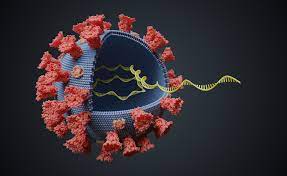A new study has shown that people who have been infected with the SARS-CoV-2 virus in the past and those who have been vaccinated for COVID19 have been found with identical clones or sets of antibody-producing white blood cells. The new study has been done by scientists from Vanderbilt University Medical Center. The SARS-CoV-2 is a causative virus that leads to COVID19 infection. The findings of the study have shed light on the selection forces that set off the emergence of many variants of the SARS-CoV-2 virus. Some of these strains might have the ability to dodge immunity that is derived from naturally occurring antibodies and protection which is obtained from the COVID19 vaccination. Health experts who have been involved in the new study have said that the existing COVID19 shots that utilize genetic material called mRNA to encode a viral protein to trigger an immune response have been proved to be effective against the delta variant so far. At present, the delta variant is rapidly spreading across unvaccinated people across the world. However, experts are worried that the concerning variant might turn more transmissible and deadly in people who have been vaccinated as well. The authors of the study have said that the findings of the study show that there is a possibility of developing more effective shots and antibody treatments for a vast range of SARS-CoV-2 strains. The outcomes of the new study have been reported in the journal that is called Cell Reports.
The corresponding author of the study, James Crowe Jr, who is the chief of the Vanderbilt Vaccine Center, has said that it is surprising that findings of the study show that there are many shared antibodies among people who have been infected with the SARS-CoV-2 virus in the past and people who have been inoculated with COVID19 shots. He has said that the findings of the study have been quite encouraging. Dr. James Crowe Jr has said that the outcomes of the study reveal that mRNA-based COVID19 shots illicit identical clones of antibody generating white blood cells that are found in people with past COVID19 infection. Dr. Crowe is a professor of pediatrics and pathology at the Vanderbilt University Medical center (VUMC). He has said that antibodies are a type of protein that is secreted by focused white blood cells that are known as B-lymphocytes. When a virus tries to attach to the surface of B cells, it fuels the cell to divide and mature into a replica of indistinguishable cells, said the corresponding author of the study. Health experts have revealed that mature B cells are known as plasma cells that are responsible for producing millions of antibodies into the bloodstream and lymphatic system. Some of these antibodies bind to the virus and block it from infecting its target cell. However, many past studies have confirmed that antibodies are not the only tool of the immune system to fight against a foreign invader.
The authors of the study have been able to identify nearly 27 public clonotypes that are usually identical clones of antibodies, which are shared by people who have recovered from COVID19 in the past and those who have been immunized against the dreaded virus. Health experts have found that most clonotypes have been produced against the spike protein of the virus that binds to a particular receptor that is found on the surface of the lungs and other tissues in the human body, which is known as ACE2 receptor. There is a part of the spike protein that keeps changing, it means it can keep mutating in different ways that can keep the virus safe from circulating antibodies in the bloodstream. The authors of the study have said that if a large group of people separately produces the same antibody against the spike protein of the virus, it might exhaust selective pressure of the virus to mutate further. The authors of the study have said that selective pressure of the SARS-CoV-2 virus has resulted in the emergence of the delta strain that is said to be more contagious as compared to the previous strain of the SARS-CoV-2 virus. Experts have said that the delta variant spreads much faster from person to person as well. During the study, scientists have come across two public clonotypes that can identify one of the most conserved regions of the spike protein that combines with the cell membrane. Experts have said that once this blending takes place, the SARS-CoV-2 virus gets an entry into its target cell where it takes control of the cell’s genetic machinery to replicate further. They have said that neutralizing antibodies that attach to the sealed part of the spike protein are very crucial, as this part of the spike protein usually does not mutate. The authors of the study have said that strains of the SARS-CoV-2 virus are unable to dodge vaccines and antibody treatments when the ‘Achilles heel’ that is a less mutable part of the spike protein is targeted. This study has been done in association with experts from Washington University School of Medicine in St. Louis, Integral Molecular Inc. in Philadelphia, and the University of Arizona College of Medicine in Tucson.
